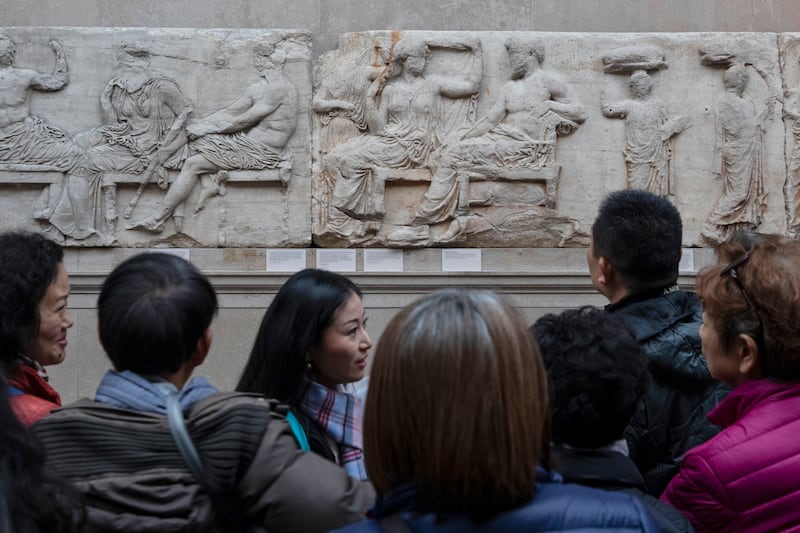A senior British MP has accused Greece of “blatant opportunism” after an archaeologist said the British Museum is “not safe” following the revelation that a large number of artefacts have gone missing from its collection.
Earlier this week it emerged that close to 2,000 artefacts were missing from the museum, with their combined value running into the “millions”.
The institution, one of the world's most famous museums, revealed last week that it was taking legal action against an unnamed member of staff – who was subsequently sacked – after items from its collection were discovered to be missing, stolen or damaged earlier this year.
Tim Loughton, the Conservative chairman of the British Museum All-Party Parliamentary Group, told BBC Radio 4's Today programme on Wednesday that news of items going missing from the museum's collection in London is “damaging” but the institution is taking the thefts “seriously”.
The MP, who has been in touch with the museum, added: “For reassurance, people want to know the extent of the objects which have disappeared, what investigations took place at the time when various reports came in and what is being done now because otherwise (it's) getting out of hand.”
“What is particularly damaging is (the) blatant opportunism of the Greeks and others saying 'Oh no, the British Museum is not safe …' It's incredibly rare that things go missing,” he said.
Earlier, director of the Association of Greek Archaeologists Despoina Koutsoumba said: “We are very much worried how many Greek items were [among] these stolen items.”
“We want to tell the British Museum that they cannot any more say that Greek cultural heritage is more protected in the British Museum,” she told BBC Radio 4's World Tonight programme on Tuesday.
Greece has been campaigning for decades for the return of the Elgin Marbles, which once adorned the Parthenon on top of the Acropolis in Athens.
“They have to return the Parthenon marbles back because they are not safe in London,” Ms Koutsoumba said, adding that the security issues exposed by the thefts are a “problem for all museums in the world”.
The museum has not specified how many items have been stolen or detailed what the missing items are, saying only that they were “small pieces” including “gold jewellery and gems of semi-precious stones and glass dating from the 15th century BC to the 19th century AD”.
The thefts happened over at least two decades, according to reports.
Athens has long claimed the Elgin Marbles were illegally acquired during a period of foreign occupation, while British officials have rebuffed repeated demands for their return.
Late last year, the British government warned the museum it was not legally allowed to break up its vast collection, after news emerged about secret talks about the return of the marbles, which were taken from Athens 200 years ago.
The 2,500 year-old sculptures were removed under a request by British diplomat in the early 19th century when he was ambassador to the Ottoman Empire.
Under the 1963 British Museum Act, which updated previous legislation, the museum can only sell or give away items from its collection under limited conditions. The process would involve it seeking a special licence from the government to break up the collection.
The British Museum says its entire collection stretches to more than eight million objects, and only about 80,000 of them are on public display at any one time.
They include many items now considered by other countries as loot taken by builders of the British Empire, and the government has long been wary of setting a precedent with the marbles.
The British Museum has ruled out returning the marbles, which include about half of the 160-metre frieze that adorned the Parthenon, insisting that they were legally acquired.
Christopher Marinello, a lawyer and expert in recovering stolen art, said the thefts by the museum’s former employee exposes it to questions over the safety of the ancient sculptures.
He said: “It makes one wonder whether the Parthenon Marbles are safe in the British Museum after all, and perhaps they should be returned to the museum in Athens for their security.”
Mr Loughton was also asked about emails leaked to BBC News that claim the British Museum was alerted to the thefts in 2021 and ignored the report.

He said: “With respect, all that's come out is a few emails rather than the bigger picture.
“But the British Museum will need to account for that because if people are trying to report potential objects having appeared outside of the museum then absolutely those need to be investigated and potentially referred to the police.
“So what action was taken? What checks and balances are there at the museum?
“Also putting into context … the British Museum has the most online documentation online in the world. There are over two million objects available online to see.”
The Telegraph has reported that the number of stolen items is believed to be “well over 1,000” and “closer to 2,000”, with a value running into “millions of pounds”.
An independent review of security has been launched and the matter is also under investigation by the economic crime command of the Metropolitan Police.
No arrests have been made.
The review will be led by former museum trustee Sir Nigel Boardman and Lucy D'Orsi, Chief Constable of British Transport Police.







